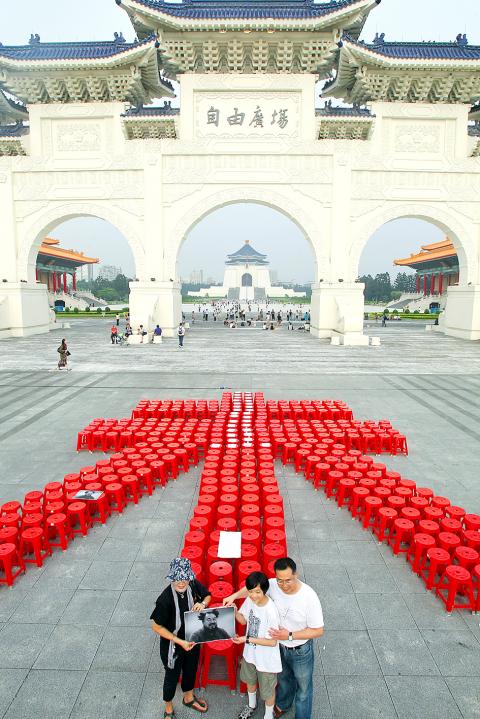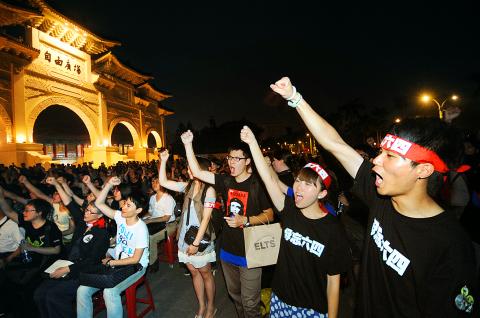Hundreds of college students assembled in Taipei last night to mark the 22nd anniversary of China’s Tiananmen Square Massacre, joining the candlelit vigils held in Hong Kong and Macau to honor the victims of the bloody crackdown and call for a spotlight on Chinese rights abuses.
Speaking at the event at Liberty Square, Wang Dan (王丹), a student leader of the 1989 pro-democracy movement, said the problems facing China today, including corruption, high unemployment, unequal distribution of wealth and moral failings, were a result of the crackdown on the movement.
“The crackdown snuffed out an opportunity” for China to peacefully transform into a democracy, he said.

Photo: Wang Wen-lin, Taipei Times
What the students appealed for would have been proven right had the crackdown not happened, as they had pointed out that China needed not only economic reform but also political reform, Wang said.
“Today, we are here to commemorate victims, to condemn killers and to boost survivors. The way to democracy is bumpy and it’s a very long way. It is because the sky is dark that we need to head toward the light. It is because the road is long that we must continue to move ahead,” he said.
The event was mainly initiated by two National Taiwan University (NTU) students from Hong Kong, along with Taiwanese students from National Tsing Hua University (NTHU), National Chengchi University (NCCU) and Soochow University, who formed a task force of Taiwanese students to promote democracy in China.

Photo: Fang Pin-chao, Taipei Times
“Candlelit vigils have been staged in Victoria Park in Hong Kong every year for the past 22 years, but it is rarely seen in Taiwan. We hope that friends in Taiwan do not forget the history,” said Fan Tsun-long (樊俊朗), an NTU student from Hong Kong.
China today poses a bigger threat than it did 22 years ago and its growing economic clout could negatively influence democratic development in Taiwan as it has already done in Hong Kong, he said.
Seaman Wong (黃俊傑), also an NTU student from Hong Kong, said the reason Taiwan must pay attention to the issue was simple — to pursue democracy, freedom and human rights, all universal values.
“Young Taiwanese do not always bear in mind high ideals and lofty aims, but 22 years ago, there were young people who sacrificed their lives fighting for those values in China,” Wong said.
Wong, who has been studying history at NTU since 2009, said the relentless efforts made by the late democracy activist Szeto Wah (司徒華) to rehabilitate the 1989 pro-democracy movement was the major reason why Hong Kongers showed a higher level of concern for the incident.
Lin Chia-hsing (林家興), an NCCU student, said that he wished the vigil would be the start of the grouping of students in Taiwan, Hong Kong and Macau, not only on June 4, but also afterwards, to encourage students in China not to give up on pursuing democracy, freedom and human rights.
Wang, currently a visiting academic at NTHU, said he was happy to see Taiwanese students attending the vigil.
“With the deepening of democracy in Taiwan, the younger generation can understand that economic exchanges with China is not all they want. They also care about political reform in China,” he said.
Earlier yesterday at Liberty Square, Bei Ling (貝嶺), an exiled Chinese poet, staged an installation art, in which 1,001 empty chairs were placed to form the characters of detained Chinese artist Ai Weiwei’s (艾未未) name to urge Beijing to release him.
“The chairs are waiting for Ai Weiwei. The installation was to let the Chinese authorities know that Ai Weiwei has not been forgotten even though he has been arrested. We are waiting for his return,” Bei said.

MAKING WAVES: China’s maritime militia could become a nontraditional threat in war, clogging up shipping lanes to prevent US or Japanese intervention, a report said About 1,900 Chinese ships flying flags of convenience and fishing vessels that participated in China’s military exercises around Taiwan last month and in January have been listed for monitoring, Coast Guard Administration (CGA) Deputy Director-General Hsieh Ching-chin (謝慶欽) said yesterday. Following amendments to the Commercial Port Act (商港法) and the Law of Ships (船舶法) last month, the CGA can designate possible berthing areas or deny ports of call for vessels suspected of loitering around areas where undersea cables can be accessed, Oceans Affairs Council Minister Kuan Bi-ling (管碧玲) said. The list of suspected ships, originally 300, had risen to about 1,900 as

Japan’s strategic alliance with the US would collapse if Tokyo were to turn away from a conflict in Taiwan, Japanese Prime Minister Sanae Takaichi said yesterday, but distanced herself from previous comments that suggested a possible military response in such an event. Takaichi expressed her latest views on a nationally broadcast TV program late on Monday, where an opposition party leader criticized her for igniting tensions with China with the earlier remarks. Ties between Japan and China have sunk to the worst level in years after Takaichi said in November that a hypothetical Chinese attack on Taiwan could bring about a Japanese

MORE RESPONSIBILITY: Draftees would be expected to fight alongside professional soldiers, likely requiring the transformation of some training brigades into combat units The armed forces are to start incorporating new conscripts into combined arms brigades this year to enhance combat readiness, the Executive Yuan’s latest policy report said. The new policy would affect Taiwanese men entering the military for their compulsory service, which was extended to one year under reforms by then-president Tsai Ing-wen (蔡英文) in 2022. The conscripts would be trained to operate machine guns, uncrewed aerial vehicles, anti-tank guided missile launchers and Stinger air defense systems, the report said, adding that the basic training would be lengthened to eight weeks. After basic training, conscripts would be sorted into infantry battalions that would take

DEEP-STRIKE CAPABILITY: The scenario simulated a PLA drill that turned into an assault on Taiwan’s critical infrastructure, with the launchers providing fire support Taiwan yesterday conducted this year’s first military exercises at Longsiang Base in Taichung, demonstrating the newly acquired High Mobility Artillery Rocket System’s (HIMARS) ability to provide fire support and deep-strike capabilities. The scenario simulated an attack on Penghu County, with HIMARS trucks immediately rolling into designated launch areas and firing barrages at the Wangan (望安) and Cimei (七美) islands, simulating the provision of fire support against invading forces. The HIMARS are supposed to “fire and leave,” which would significantly increase personnel and equipment survivability, a military official said. The drill simulated an exercise launched by the Chinese People’s Liberation Army (PLA) Eastern